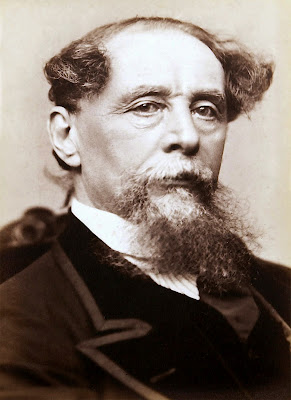Charles John Huffam Dickens (/ˈtʃɑrlz ˈdɪkɪnz/; 7 February 1812 – 9 June 1870) was an English writer and social critic. He created some of the world's best-known fictional characters and is regarded as the greatest novelist of the Victorian era. His works enjoyed unprecedented popularity during his lifetime, and by the twentieth century critics and scholars had recognised him as a literary genius. His novels and short stories enjoy lasting popularity.
Born in Portsmouth, Dickens left school to work in a factory when his father was incarcerated in a debtors' prison. Despite his lack of formal education, he edited a weekly journal for 20 years, wrote 15 novels, five novellas, hundreds of short stories and non-fiction articles, lectured and performed extensively, was an indefatigable letter writer, and campaigned vigorously for children's rights, education, and other social reforms.
Dickens's literary success began with the 1836 serial publication of The Pickwick Papers. Within a few years he had become an international literary celebrity, famous for his humour, satire, and keen observation of character and society. His novels, most published in monthly or weekly instalments, pioneered the serial publication of narrative fiction, which became the dominant Victorian mode for novel publication. The instalment format allowed Dickens to evaluate his audience's reaction, and he often modified his plot and character development based on such feedback. For example, when his wife's chiropodist expressed distress at the way Miss Mowcher in David Copperfield seemed to reflect her disabilities, Dickens improved the character with positive features. His plots were carefully constructed, and he often wove elements from topical events into his narratives. Masses of the illiterate poor chipped in ha'pennies to have each new monthly episode read to them, opening up and inspiring a new class of readers.
Dickens was regarded as the literary colossus of his age. His 1843 novella, A Christmas Carol, remains popular and continues to inspire adaptations in every artistic genre. Oliver Twist and Great Expectations are also frequently adapted, and, like many of his novels, evoke images of early Victorian London. His 1859 novel, A Tale of Two Cities, set in London and Paris, is his best-known work of historical fiction. Dickens's creative genius has been praised by fellow writers—from Leo Tolstoy to George Orwell and G. K. Chesterton—for its realism, comedy, prose style, unique characterisations, and social criticism. On the other hand Oscar Wilde, Henry James, and Virginia Woolf complained of a lack of psychological depth, loose writing, and a vein of saccharine sentimentalism. The term Dickensian is used to describe something that is reminiscent of Dickens and his writings, such as poor social conditions or comically repulsive characters.
Here are some books written by Charles Dickens:
Excerpt from Wikipedia
Novels
- The Pickwick Papers
- The Adventures of Oliver Twist
- Nicholas Nickleby
- The Old Curiosity Shop
- Barnaby Rudge
- Martin Chuzzlewit
- Dombey and Son
- David Copperfield
- Bleak House
- Hard Times
- Little Dorrit
- A Tale of Two Cities
- Great Expectations
- Our Mutual Friend
- The Mystery of Edwin Drood
Novellas
- A Christmas Carol
- The Chimes
- The Cricket on the Hearth
- The Battle of Life
- The Haunted Man and the Ghost's Bargain
Short Stories
- The Lamplighter
- The Sewer-Dwelling Reptiles
- A Child's Dream of a Star
- Captain Murderer
- A Christmas Tree
- What Christmas is, as We Grow Older
- The Poor Relation's Story
- The Child's Story
- To be Read at Dusk
- The Long Voyage
- The Schoolboy's Story
- Nobody's Story
- The Seven Poor Travellers
- The Holly-tree Inn
- Prince Bull
- Thousand and One Humbugs
- Hunted Down
- The Wreck of the Golden Mary
- The Perils of Certain English Prisoners
- Going into Society
- The Lazy Tour of Two Idle Apprentices
- Reprinted Pieces
- The Haunted House
- A Message from the Sea
- Tom Tiddler's Ground
- Somebody's Luggage
- Mrs Lirriper's Lodgings
- Mrs Lirriper's Legacy
- Doctor Marigold's Prescriptions
- The Trial for Murder
- Mugby Junction
- The Signal-Man
- No Thoroughfare
- George Silverman's Explanation
- Holiday Romance
- The Uncommercial Traveller
- The Queer Chair
- The Ghosts of the Mail
- The Baron of Grogzwig
- A Madman's Manuscript
- The Goblins who Stole a Sexton
- A Ghost in the Bride's Chamber
Short Stories Collection
- Sketches by Boz
- Sketches of Young Gentlemen
- Sketches of Young Couples
- Master Humphrey's Clock
- Boots at the Holly-tree Inn: And Other Stories
- Reprinted Pieces
- The Mudfog Papers
Non-Fiction
- Sunday Under Three Heads
- American Notes
- Pictures from Italy
- The Life of Our Lord
- A Child's History of England
- The Uncommercial Traveller
- Speeches, Letters and Sayings
- Letters of Charles Dickens to Wilkie Collins
Poetry
- The Fine Old English Gentleman
- The Complete Poems of Charles Dickens
Plays
- The Strange Gentleman
- The Village Coquettes
- The Frozen Deep
Articles and Essays
- A Coal Miner's Evidence
- Frauds on the Fairies
- In Memoriam W. M. Thackeray the first!
- The Lost Arctic Voyagers






No comments:
Post a Comment